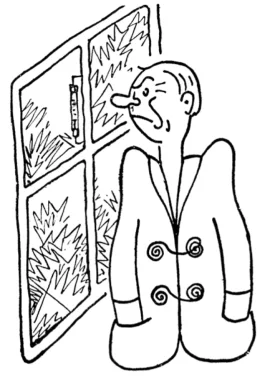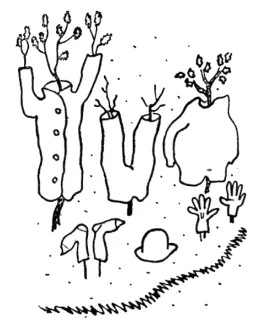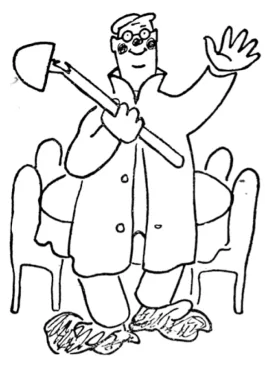
I first reprinted from The Gardener’s Year way back in 1990 in the third issue of GREENPRINTS. It was then—and remains today—my all-time favorite gardening book. So I can’t resist reprinting from it again here, in the issue that closes out our 30th year.
Capek lived in Czechoslovakia in the first half of the 20th century. Known as a playwright and science-fiction writer—he invented the word “robot“—he only wrote one small gardening book (illustrated by his brother), but its charm, passion, and humor have kept it in print up to today. Enjoy!
Even January is not a time for idleness in the garden,“ say the handbooks on gardening. Certainly not; for in January the gardener
CULTIVATES THE WEATHER
There is something peculiar about the weather; it is never quite right. Weather always shoots over the mark on one side or the other. The temperature never reaches the hundred years’ normal; it is either five degrees below or five degrees above. Rainfall is either ten millimetres below the average or twenty millimetres above; if it is not too dry, it is inevitably too wet.
If people who are not concerned with the weather have so many reasons for complaining about it, what should a gardener say! If too little snow falls, he grumbles that it reaches nowhere; if too much, he says that he is afraid that it will break his conifers and hollies. If there is no snow, he complains of pernicious black frosts; if the thaw sets in, he curses the mad winds which come with it, and have the damnable habit of upsetting his brushwood and other coverings in the garden, or perhaps, devil take them! will even break the trees. If the sun dares to shine in January the gardener is on tenterhooks lest the bushes will burst into bud too soon. If it rains, he fears for his little Alpine flowers; if it is dry, he thinks with pain on his rhododendrons and andromedas. And yet it would be so easy to satisfy him. It would be quite nice if from the first of January it were nine-tenths of a degree below zero, one hundred and twenty-seven millimetres of snow (light and, if possible, fresh), rather cloudy, calm, or with mild winds from the west; and all would be well. But nobody minds us gardeners, and nobody asks us what things ought to be. That’s why the world is as it is.
The gardener is at his worst when the black frosts set in. Then the earth stiffens and dries to the bone, day after day, and night after night, deeper and deeper; the gardener thinks of roots which freeze in the soil, dead and hard as stone; of twigs chilled to the pith by the dry and icy wind; of the freezing bulbs, into which in autumn the plant packed all that it had. If I knew that it would help, I would wrap my holly in my own coat, and drop my pants over the juniper; I would take off my own shirt for you, Azalea Pontica; I would cover you with my hat, Alum Root, and for you, Coreopsis, nothing is left but my socks: be thankful for them.
There are a number of tricks for deceiving the weather and making it change. If, for instance, I decide to put on the warmest clothes I possess, the temperature usually rises. And a thaw also sets in if some friends arrange to go to the mountains to ski. And also, when somebody writes an article for the paper, in which he describes the frost, the healthy colored cheeks, the crowds on the ice, and other phenomena, the thaw comes just when this article is being set up in the composing-room, and people read it while outside a mild rain is falling, and the thermometer points to forty-six above zero; then, of course, the reader says that the papers are full of lies and bluff; bother the newspapers! On the other hand, cursing, complaints, swearing, snuffling, saying “burrr,” and other incantations have no influence on the weather.

Well, then, “even January is not a time for idleness in the garden,“ as—certainly only for comfort—the handbooks of gardening assert. First, it is possible to cultivate the soil because frost is supposed to make it crumble. Right! On New Year’s Day the gardener rushes into the garden to cultivate the soil. He goes for it with the spade; after a prolonged struggle he succeeds in breaking the spade against the soil, which is as hard as corundum. Then he takes the hoe; if he tries hard he breaks the handle! He fetches the pickaxe, and manages at least to hack up a tulip bulb which he planted in autumn. His only method of tilling the soil is with a hammer and chisel, but this is a slow process which soon tires. Perhaps one may loosen the soil with dynamite, but this the gardener usually does not possess. Well, then, leave it alone till the thaw comes.

And look, the thaw is here, and the gardener rushes into the garden to till the soil. After a while he brings home, stuck to his boots, all that has thawed on the surface; nevertheless he looks happy and declares that the earth is opening already. In the meantime nothing is left but “to do some work ready for the coming season.” “If you have a dry spot in the cellar, prepare soil for potting by carefully mixing leafmould, compost, well-rotten cow-dung, and a little sand.” Splendid! Only there is coal and coke in the cellar; these women take up all the space with their silly household stores. Perhaps in the bedroom there might be room for a nice little heap of humus—
“Use the winter period for repairing the pergola, arches, or the summer-house.” Exactly; only I happen to have no pergola, arches, or summer-house. “Even in January it is possible to lay down a lawn“—if only there were a place for it; perhaps in the hall, or in the loft. “The chief thing is to watch the temperature in the greenhouse.“ Very well, I should love to, but I have no green-house. These handbooks of gardening don’t tell you very much. ❖




